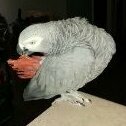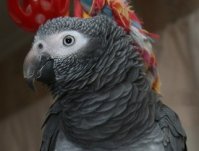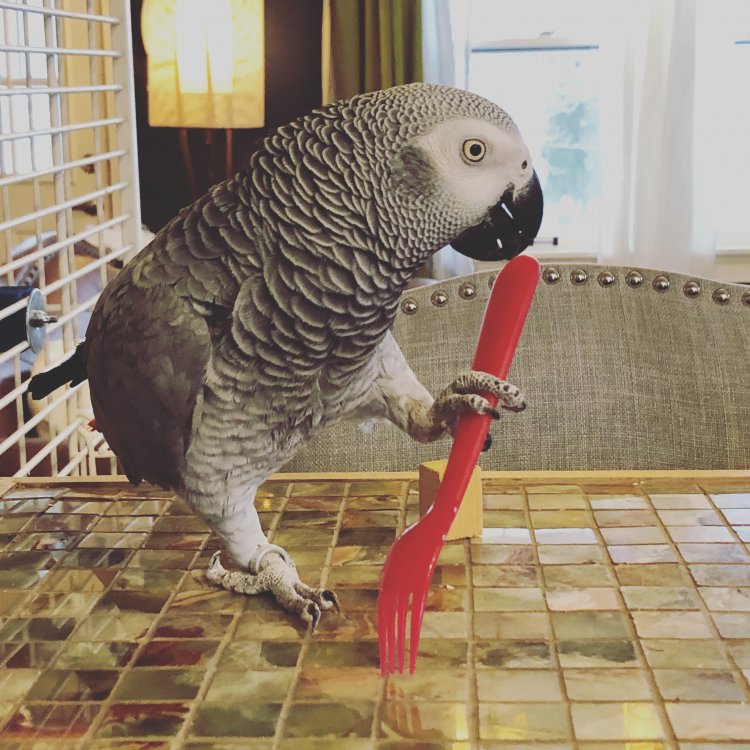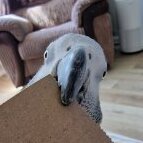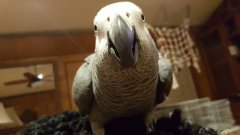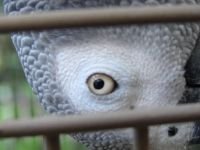NEW ADDRESS FOR MEMBERS GREYFORUMS.ORG
Leaderboard
Popular Content
Showing content with the highest reputation on 03/28/2018 in all areas
-
You don't have to whistle back, although I don't think it does any harm, but do answer him. He wants to know where the members of his flock are and what they're doing. Have other members of your household answer him as well. He's aggressive because he's still reacting from fear. Just keep being calm and consistent . There's no telling how long it will take him to feel safe and secure in your home, but it will happen as long as you don't give up. He's lucky to have landed in a home where his owner is reaching out for information on how to deal with him.3 points
-
Good Day Everyone I have joined GreyForums because I am in a very difficult situation and dont know what to do from here. First of all I would like to say that I have 15 parrots, and we have built a huge aviary so that each one may have huge space to fly and play. Much more space than I could provide with store-bought cages, however they are all tame and hand-reared by me (with the exception of a few rescued Greys). My problem at the moment is my female senegal parrot. I have handreared her from the age of three weeks, and she is 6 years old now. Over the years she has shown abnormal behaviour where she snaps and tries to kill another, bird or human, and it has been getting worse with time. She goes for the jugular, or the eyes without being provoked and for no apparent reason. And then the next minute she is normal again. I have seen this behaviour before but not as extreme with other birds as I am an avian behaviorist, and I feel that I have tried everything to help her. From supplements, veterinery care, reassurance, scheduled times, food, treats, toys. But she continues to grow worse. This past week she killed my female ringneck. She found a way to squeeze through a gap in the mesh not more than 1,5 cm in length and width, and she flew in from above to get my female ringneck in her eye and tried to take her head off. She had no other wounds on her body, just this one. It was absolutely horrific to walk in on her little body like this, and the senegal standing over her... And the senegal has it out for the other birds. She has tried to kill one of the pionus by taking out her stomach. I had to intervene with my hands as it happened so fast. She has tried to kill the other male indian ringneck to the point where she took out one of his ears, a portion of his throat, and his wing. He had to go for reconstructive surgery for his throat and wing, and it was a miracle that he survived but he can never fly again. She removed too much of his wing and it wasnt able to heal. And she tried to kill my cockatoo, even my greys are terrified of her. I believe that they can sense when another animal is not stable, as I have had many rescues over they years. This behaviour has occurred since she was a baby, and I am in absolute grief over losing my female ringneck and knowing that the others are in constant danger and that she has a serious mental disorder. I dont know what to do anymore, and am considering giving her to a good home. My husband and I have found such a place. But this is such a difficult decision for me as I am trying to balance my emotions for her versus the need to protect all my other birds. I cannot seem to find a way around keeping her and protecting the others. Over the years she has has found opportunities when maybe a feeding bowl wasnt clipped in from the outside, or the mesh had a small gap in it, or maybe when feeding or cleaning bowls. And I shudder to think that if I dont act now and something had to happen to any other birds over time, knowing that I could've prevented it... I just wanted to know if anyone has any understanding on mental disorders treatment for birds, or perhaps any suggestions? My family believes that both her and her partner were inbred as they both display this abnormal behaviour and were both adopted from the same breeder who has proven not to be a good over the years. I rescued one of my greys from him because he kept her in a cage in a room separate from the house for three years in complete solitude, only giving her basic sunflower seeds and water when he had to. Needless to say, she had some serious behavioural issues. And this I realised too late, after already having adopted and raised both senegals long before. Thank you so much for hearing me out2 points
-
Thank you Acappella, wonderful post...I feel this Grey is a little more wild than not..You are correct about whistling back, my recommendation is in the wild, parrots don't "talk" as we know it, their preference of communication is screeches and whistles which is how they greet us...A parrot will take the easy way out if they feel they can get away with it...Some parrots never talk.. By talking over whistling back, it's reinforcing speech communication over whistles. Unfortunately, a Grey reverts back to whistles with less or no talking at an early age An example: we teach poop stations to our flighted fids. We have small pieces of newspaper and we watch the bird, find a poop pattern, and every time we find poop where we want them to poop, we show them the paper and place it on the ground. In time, this is where they poop besides their cage and play stand. As intelligent as a Grey is, they are still a creature of habit.2 points
-
Wow, she's already coming out of her cage on her own! That's not nothing. It took my Dorian over a year to stick his head outside his cage, and he was only cage-bound for 3 1/2 years. Sounds like you have a very brave girl. Check out the body language thread in the Training room, there's a lot of good info there. Spend lots of time by her cage just talking to her, reading to her (children's books are great). Where in the home have you got her cage? Is it where she can observe her new flock? Is she used to being covered and getting 10-12 hours of sleep a night? Greys really are slow to change, but as long as you're in it for the long haul, it can be very rewarding. Sometimes we recommend new owners keep a journal so that they can look back on it and see how far they've come later on. Thank you for taking on a rescue. She's gorgeous.2 points
-
I gave her half with the shell on last night, she ate all of the egg and most of the shell. She seemed to really enjoy it I'll give her the other half tonight.2 points
-
Hello and Welcome to our family. What a beauty you have there. Thank you for,posting a pic! Looking forward to hearing more!2 points
-
Hello all - I’ve recently adopted a female CAG who is aproximatly 18-20 years old. Her name is Maxi and she lived cage bound in the same home since she was a baby. We’ve had her about two months or so at this point and she is very sweet however does not tolerate touching and does not step or nor know how to step up from what I can tell. Anyways, I’m going to start a thread under the general section that will have a few questions in it. Any feedback or information would be greatly appreciated. Thanks everyone!1 point
-
Greetings, After researching the drugs mentioned, I recommend you research them yourself, You have decision too choose from on what to do.......You could try Chamomile tea...1 point
-
You might talk to your vet about trying Haloperidol. I have a bird that is on it. I hate using meds on birds but with my guy, if I don't use it, he'll tear his feet up enough that he'll get infections and eventually it will kill him. We've also considered trying a prozac type med too but decided against it since what we use now is working.1 point
-
1 point
-
Thank you so much for joining the Forum..We would love to hear your about your flock and see photos..With your Senegal, I'm going to do some research. For now I would put the fid in it's own cage, away from the others birds...1 point
-
Well done you for taking in a rescue bird. Others have already given lots of suggestions and far more advice than I could provide. Grey's are fascinating birds and I'm sure Maxi will bring you lots of happiness for many years. The main thing to remember is that everything right now is new to Maxi and it will take her some time to learn about her new home and her new flock. As others have said it's all about patience and "Grey time". She will let you know when she is ready to advance to the next stage of the relationship... Whether it's a head scratch, responding to you vocally or willingly stepping up for then first time. There is a massive amount of information on these forums so feel free to look around and dig into some older threads. And never be afraid to ask questions!1 point
-
The hard boiled egg is a little better with the shell on for natural calcium and help replace any nutrients loss..Please don't feed supplements with out a vets approval...You know us old people, I hide my own Easter eggs and forget where I hid them in 5 minutes.....1 point
-
Thank you, Maggie, for the update. I have waiting to hear. Love ans prayers, Howardine1 point
-
Harry my Umbie Too who now lives elsewhere enjoyed a spoon as well. After eating it could be used on the cage bars to make "music".1 point
-
Oh wow, that's amazing. I think Alfie would probably just throw the spoon at my head. Or maybe throw it across the room and expect me to fetch it for him so he can do it again.1 point
-
I remember getting 12 tapes or records for .99 cents, the having to buy 3 more at full price in a year?1 point

